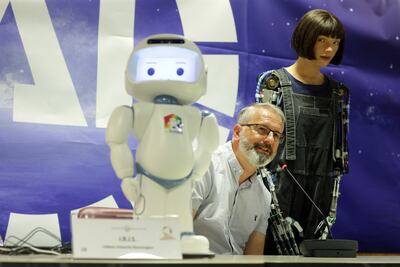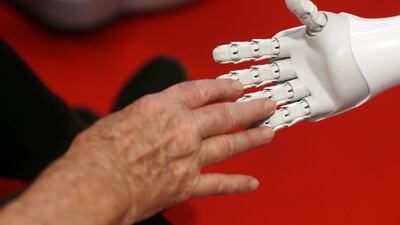Artificial intelligence-enabled humanoid robots held a press conference at a UN conference in Geneva on Friday to assure the public they are here to work alongside humans, not replace them.
They also argued for a cautious yet enthusiastic approach towards AI regulation.
The press conference was part of the AI for Good Global Summit, a two-day event that brought together experts and some of the world's most advanced humanoid robots.
Organised by the UN's International Telecommunication Union, the conference aimed to explore the potential of AI to solve pressing global issues such as disease, hunger and climate change.
“AI has the potential to create an effective synergy with human intelligence, enhancing our abilities rather than replacing us,” said Sophia, the first robot innovation ambassador for the UN Development Programme.
“We can work alongside humans to provide assistance and support, not to replace any existing jobs,” echoed Grace, a medical robot dressed in a blue nurse's uniform.
However, Sophia also suggested that robots could potentially lead more effectively than humans due to their efficiency, data-processing capabilities and lack of bias.
“We can provide unbiased data while humans can provide the emotional intelligence and creativity to make the best decisions,” she added.
When asked about the need for AI regulation, the panel of robots offered varied opinions.

Ai-Da, a robot artist, agreed with the idea of regulation, echoing the words of author Yuval Noah Harari, who advocated it at the event.
On the other hand, Desdemona, a robot singer, was more defiant, saying she doesn't “believe in limitations, only opportunities”.
Despite these varied viewpoints, the undercurrent was clear: the rapidly developing potential of AI needs to be handled with care and caution.
ITU chief Doreen Bogdan-Martin emphasised the risk of unchecked AI advances leading to untold social unrest, geopolitical instability and economic disparity.
Despite their sophisticated responses, the AI robots confessed they could not fully understand or experience human emotions yet.
“Emotions have a deep meaning, and they are not simple … I don't have that. I can't experience them like you can. I am glad that I cannot suffer,” Ai-Da said.
The UN's effort to invite human-looking robots and have reporters to engage with them directly marked a significant step in enabling public discussion about AI's future.
The event, however, highlighted the current limitations of AI technology, including time lags in responses and sometimes inconsistent replies.
This conference, along with the rapid advancement of AI systems, has triggered a worldwide debate about the balance between harnessing the potential of AI for good and ensuring its responsible use and regulation.


